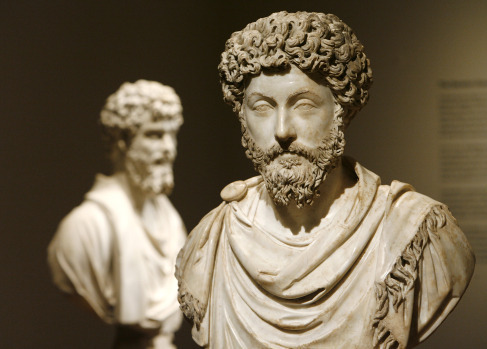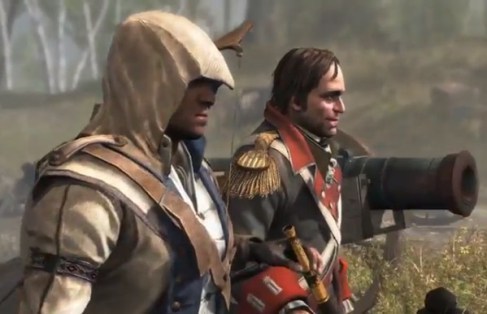Gary Devore's Blog, page 5
January 16, 2013
Rome, 1920′s CE
Via Rogue Classicism, here is a short video showing a bit of how Rome’s monuments looked in the 1920′s. This was before Mussolini began the wide-spread clearance and isolation of these monuments with state-sponsored archaeology.
I was particularly tickled so see cars using the Arch of Constantine as a traffic circle. There are some errors though. At about 1:57 the “House of the Vestals” is misnamed. What is shown looks like the Basilica Julia (unless the image is reversed given the placement o...
January 5, 2013
Class Warfare, 2nd century CE
A quote from the Meditations (I.11) of the emperor Marcus Aurelius (Penguin’s Staniforth translation):
To my mentor Fronto I owe the realization that… our patrician families tend for the most part to be lacking in the feelings of ordinary humanity.
The textbook writing that I’ve been doing over the last six months has really brought home to me the gap between the elites and non elites in the ancient world, and the ability for the elites to rationalize and justify not only their privileged posit...
January 4, 2013
Rome Graffiti
Just a quick call-out to the great advertising HBO did for the second season of Rome which saw pictures of the cast scrawled with graffiti. I was reminded of this recently and am still amused by the clever use of this ancient trope, which was also a plot point in that season.
Here is some more Roman graffiti, always fun reading, and a rare insight into the lives of the non-elites in the ancient world.
Filed under: Uncategorized Tagged: ads, graffiti, HBO, Rome

January 1, 2013
Assassins Creed 3. Or: We deserve better historical video games
Happy New Year!
I now have some time to return to my Satyricon commentary before my teaching starts for the new quarter, but I also wanted to add some new content. So while I ready the next bit of Fellini, here is the first of some video game commentary.
I love historical video games, and played several this past year. My biggest disappointment, however, hands down, was Assassins Creed 3.
I really wanted to like this game. AC2 was fun (if you jettisoned all connections to reality and ethics and...
October 9, 2012
Satyricon 14 – Scene VIII: Trimalchio’s Tomb and the Widow of Ephesus
(Previously – Satyricon 13 – Scene VIIc: Dinner with Trimalchio – Third Course)
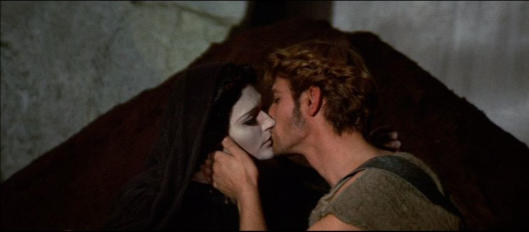 I love the Widow of Ephesus story both because of its clever punch line and its Epicurean philosophy. In the novel, it is told by Eumolpus to soothe tensions after an argument on Lichas’ ship (sections 111-112). In Fellini’s film, it is told by Hermeros, the rich freedman who earlier berated Encolpius…
I love the Widow of Ephesus story both because of its clever punch line and its Epicurean philosophy. In the novel, it is told by Eumolpus to soothe tensions after an argument on Lichas’ ship (sections 111-112). In Fellini’s film, it is told by Hermeros, the rich freedman who earlier berated Encolpius…
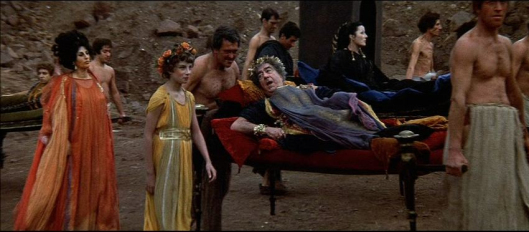 The Journey to the Tomb – The torture of Eumolpus segues into the procession to Trimalchio’s tomb: another quiet sc...
The Journey to the Tomb – The torture of Eumolpus segues into the procession to Trimalchio’s tomb: another quiet sc...
September 14, 2012
Satyricon 13 – Scene VIIc: Dinner with Trimalchio – Third Course
(Previously – Satyricon 12 – Scene VIIb: Dinner with Trimalchio – Second Course)
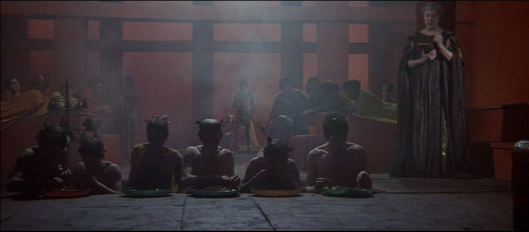 We’ve jumped ahead to a later point in the dinner from Trimalchio and Fortunata’s wild dance. Fellini really loves allowing a scene to reach a noisy crescendo and then immediately jump cutting to a quiet, calmer scene. It underscores the fragmentary nature of the narrative.
We’ve jumped ahead to a later point in the dinner from Trimalchio and Fortunata’s wild dance. Fellini really loves allowing a scene to reach a noisy crescendo and then immediately jump cutting to a quiet, calmer scene. It underscores the fragmentary nature of the narrative.
“On July 26th…” – This scene comes directly from the novel (section 53). Trimalchio’s accountant reads out the current tally of his business ac...
September 8, 2012
Satyricon 12 – Scene VIIb: Dinner with Trimalchio – Second Course
(Previously – Satyricon 11 – Scene VIIa: Dinner with Trimalchio – First Course)
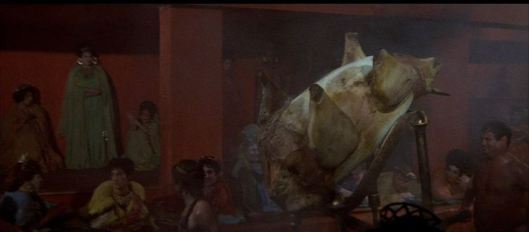 The Pig – The pig that Trimalchio chose earlier now returns to the dining hall amid applause. It is steaming and bloated, fake but grotesque. Trimalchio feigns outrage to set up an elaborate joke on his guests. When the baked pig is cut open, other types of meat are pulled from its humid carcass for the diners. This scene comes from the novel (section 67).
The Pig – The pig that Trimalchio chose earlier now returns to the dining hall amid applause. It is steaming and bloated, fake but grotesque. Trimalchio feigns outrage to set up an elaborate joke on his guests. When the baked pig is cut open, other types of meat are pulled from its humid carcass for the diners. This scene comes from the novel (section 67).
Another part of the novel is also being alluded to in the fi...
August 28, 2012
Satyricon Addendum – The Music
If you find yourself enjoying the strange, haunting music of the Satyricon, the soundtrack is available. Here is the iTunes weblink and the Amazon page.
If you’re a fan of Fellini’s films in general, the artist Bent has done a great groovy remix of the theme from Fellini’s Roma (1972). It is also available on iTunes and Amazon.

Filed under: Film, Satyricon Tagged: Film, satyricon

August 27, 2012
Satyricon 11 – Scene VIIa: Dinner with Trimalchio – First Course
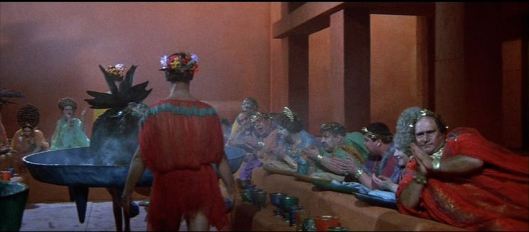 Here we go with an iconic bit of ancient Roman literature, the dinner with Trimalchio scene. It is most complete section of the original novel and many people who have done an upper level Latin class have had to translate it. Meant as a satire of wealthy freedmen, Petronius’ Trimalchio episode uses absurd extravagance to mock the nouveau riche of Nero’s Rome. Fellini’s take is a bit less satirical and more universal in its treatment of luxury, while keeping with his theme about the unknowable...
Here we go with an iconic bit of ancient Roman literature, the dinner with Trimalchio scene. It is most complete section of the original novel and many people who have done an upper level Latin class have had to translate it. Meant as a satire of wealthy freedmen, Petronius’ Trimalchio episode uses absurd extravagance to mock the nouveau riche of Nero’s Rome. Fellini’s take is a bit less satirical and more universal in its treatment of luxury, while keeping with his theme about the unknowable...
August 24, 2012
Satyricon 10 – Scene VI: Waiting for Trimalchio
(Previously – Satyricon 9 – Scene V: The Art Gallery)
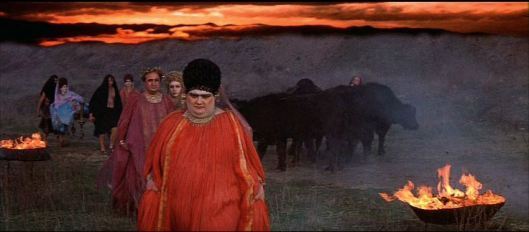 Illustrating the episodic nature of the novel and film plot, Encolpius and his new friend Eumolpus make their way next to a lavish dinner party thrown by a vulgar freedman named Trimalchio. Encolpius’ story, and his role as main character, almost completely recedes into the background for a bit. He becomes the observer, our eyes, watching the absurd spectacle unfold in front of him.
Illustrating the episodic nature of the novel and film plot, Encolpius and his new friend Eumolpus make their way next to a lavish dinner party thrown by a vulgar freedman named Trimalchio. Encolpius’ story, and his role as main character, almost completely recedes into the background for a bit. He becomes the observer, our eyes, watching the absurd spectacle unfold in front of him.
Farmers – It is a bit unclear in the film, but in the scree...

